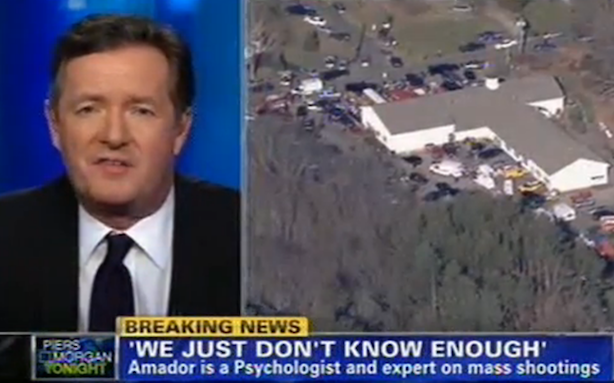Adam Lanza, Asperger's, and the Media Narrative on Autism and the Mentally Ill

Researchers have found no connection between autism and violence, but that hasn't stopped the mainstream media from harping on Newtown shooter Adam Lanza's apparent bout with Asperger's syndrome, a form of autism but is no longer listed in the DSM-5. Of course, it hasn't stopped the emotional responses from those familiar with autism, either.
RELATED: What Research Can Tell Us About the Newtown Shootings
In a string of heated interviews that sought to get both sides of the post-Sandy Hook debates on gun ownership and mental illness, CNN's Piers Morgan booked a guest who suggested autistic people may be more prone to acting out violent fantasies. Asperger's was a central component of 60 Minutes's report on Lanza Sunday night, including a statement from an advocacy group that insisted those with Asperger's are more likely to be victims of violence than proponents of it. Media critics have also singled out Fox News and The New York Times as outlets that have overplayed the connection between Lanza's action and any developmental disorders he may have had. (A high school advisor also said Lanza had a rare condition in which he couldn't feel pain.) Here's how people with intimate knowledge of autism have been combatting the misinformation since Friday's attacks in Connecticut:
RELATED: How the Internet Got the Wrong Lanza
National Journal's Ron Fournier penned a poignant account of watching his son, who has Asperger's, sifting through such coverage:
Tyler is an Aspie. He shrugged. “If you meet somebody with Asperger’s,” he said, “you’ve only met one person with Asperger’s.”
Tyler's point is worth us all noting: Don’t overgeneralize. Don’t stigmatize in a rush to explain inexplicable evil. Autism didn't cause this tragedy ... Just as no “typical” person deserves to be tar-brushed with the evil acts of another, Aspies don’t deserve the bad press they’re getting.
Emily Willingham, a science writer who has an autistic son, wrote about the mistaken assumption that autism makes people incapable of empathy:
Research shows that people with Asperger's are not that great at cognitive empathy but that their emotional empathy does not differ from people without Asperger's ... When [my son] learned about [the shootings], his first response was to turn away in the chair where he was sitting, drooping his head over the back. He stayed that way for many long minutes, quiet and still. When he turned around again, my child who rarely, rarely cries, had tears in his eyes.
Willingham also noted that if any connection between autism and violence exists, it's the reverse of what has been portrayed in the media: "Autistic people are far more likely to have violence done against them than to do violence to others," she writes.
RELATED: Adam Lanza: What We Think We Know About the Apparent Newtown Shooter
A blogger known as Neurodivergent K writes that the new trend of associating autistic people with violent is no better than when abused children, bullied students, and those taking prescription medication were under unfair suspicion:
Now every time someone does something violent, they are speculated to be autistic. And, just as some killers who were speculated to have crappy home lives actually did, just as the Columbine killers actually were bullied, there is a possibility that there will be a mass shooter who is Autistic.
But that does not make all of us dangerous ... Passing the blame down to another group without power hurts people.
Perhaps the most widely circulated personal essay about the shooting came from Liza Long, the mother of a mentally ill and sometimes violent son who suggested "I am Adam Lanza’s mother." But this post has proven controversial amongst autism bloggers. Kerima Cevik, mother of a 10-year-old autistic son, writes in her sternly worded retort "You Are NOT Adam Lanza's Mother":
To conflate Autistic meltdowns with murderous rage places an entire population of children and Adults who are already terribly abused at horrible risk for harm ... Kindly apologize to my son and the many families in the Autism community that you have placed at risk for seclusion, restraint and the other by products of fear and ableist bigotry.
Though they read a bit more sanitized than these impassioned personal responses, autism advocacy groups have also issued statements decrying coverage of Newtown. The Autism Society writes, "To imply or suggest that some linkage exists is wrong and is harmful to more than 1.5 million law abiding, non-violent and wonderful individuals who live with autism each day." And the Autism Global Initiative director Valerie Paradiz says, "The eyes of the world are on this wrenching tragedy—with 1 in 88 now diagnosed, misinformation could easily trigger increased prejudice and misunderstanding."
